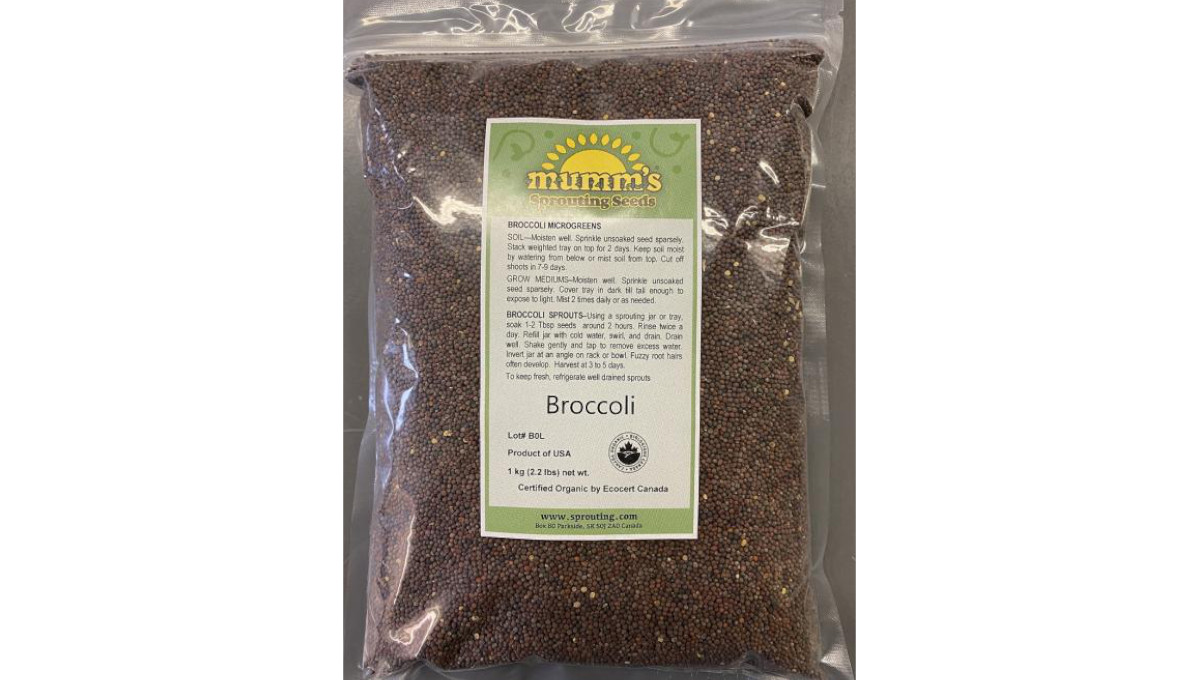Mumm’s Sprouting Seeds is recalling its “Sprouting Seeds” brand broccoli seeds because of possible Salmonella contamination.
Consumers, retailers, distributors and manufacturers should not use, repackage or sell the recalled products, according to the Canadian Food Inspection Agency. Any sprouts generated from these seeds should be discarded.
The recalled products have been sold nationally in Canada and through Internet sales. Some of the seeds are packaged in consumer-sized pouches and others are packaged in larger quantities for use by sprout producers.
Consumers and producers can use the following label information to determine whether they have the recalled seeds in their possession.
| Brand | Product | Size | UPC | Codes | Additional information |
| Mumm’s Sprouting Seeds | Broccoli | 1 kg | None | B0L | This product may have been sold to consumers |
| Mumm’s Sprouting Seeds | Broccoli | 5 kg | None | B0L | This product was sold to companies that process and/or repackage the seeds |
| Mumm’s Sprouting Seeds | Broccoli | 10 kg | None | B0L | This product was sold to companies that process and/or repackage the seeds |
| Mumm’s Sprouting Seeds | Broccoli | 25 kg | None | B0L | This product was sold to companies that process and/or repackage the seeds |
Recalled products should be thrown out or returned to your supplier, according to a recall notice posted by the Canadian Food Inspection Agency.
About Salmonella infections
Food that is contaminated with Salmonella bacteria usually does not look, smell or taste spoiled. Anyone can become sick with a Salmonella infection, but infants, children, seniors and people with weakened immune systems are at higher risk of serious illness.
Anyone who has eaten any of the products listed above, or sprouts from them, and developed symptoms of Salmonella infection should seek medical attention. Sick people should tell their doctors about the possible exposure to Salmonella bacteria because special tests are necessary to diagnose salmonellosis. Salmonella infection symptoms can mimic other illnesses, frequently leading to misdiagnosis.
Symptoms of Salmonella infection can include diarrhea, abdominal cramps and fever within 12 to 72 hours after eating contaminated food. Otherwise healthy adults are usually sick for four to seven days. In some cases, however, diarrhea may be so severe that patients need to be hospitalized.
Older adults, children, pregnant women and people with weakened immune systems, such as cancer patients, are more likely to develop a severe illness and serious, sometimes life-threatening conditions.
It is possible for some people to be infected with the bacteria and to not get sick or show any symptoms, but to still be able to spread the infection to others.
(To sign up for a free subscription to Food Safety News, click here.)

